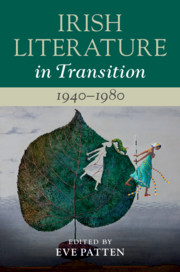Book contents
- Irish Literature in Transition, 1940–1980
- Irish Literature in Transition
- Irish Literature in Transition, 1940–1980
- Copyright page
- Contents
- Contributors
- Series Preface
- General Acknowledgements
- Introduction
- Part I After the War: Ideologies in Transition
- Part II Genres in Transition
- Part III Sex, Politics and Literary Protest
- Part IV Identities and Connections
- Part V Retrospective Frameworks: Criticism in Transition
- Chapter 17 Literary Biography in Transition
- Chapter 18 Publishing, Penguin and Irish Writing
- Chapter 19 Curriculum to Canon: Irish Writing and Education
- Chapter 20 Critics, Criticism and the Formation of an Irish Literary Canon
- Index
Chapter 17 - Literary Biography in Transition
from Part V - Retrospective Frameworks: Criticism in Transition
Published online by Cambridge University Press: 28 February 2020
- Irish Literature in Transition, 1940–1980
- Irish Literature in Transition
- Irish Literature in Transition, 1940–1980
- Copyright page
- Contents
- Contributors
- Series Preface
- General Acknowledgements
- Introduction
- Part I After the War: Ideologies in Transition
- Part II Genres in Transition
- Part III Sex, Politics and Literary Protest
- Part IV Identities and Connections
- Part V Retrospective Frameworks: Criticism in Transition
- Chapter 17 Literary Biography in Transition
- Chapter 18 Publishing, Penguin and Irish Writing
- Chapter 19 Curriculum to Canon: Irish Writing and Education
- Chapter 20 Critics, Criticism and the Formation of an Irish Literary Canon
- Index
Summary
This chapter explores some of the usages to which biography – and particularly literary biography – was put in the middle decades of the twentieth century. The analysis begins with Benedict Kiely’s Poor Scholar: A Study of the Works and Days of William Carleton (1947), and subsequently traces the many engagements that were made by Norman A. Jeffares, Richard Ellmann and others with the titanic figures of James Joyce and William Butler Yeats. It then discusses how the much less canonical ‘The Irish Writers Series’, published by Bucknell University, provided a much-utilised platform for students and critics of modern Irish writing, with biographies ranging in subject from James Clarence Mangan to Edna O’Brien. Reflecting on a number of biographies of Irish writers written in this period, it considers the impact of literary biography on the shaping of a twentieth-century narrative of modern Irish writing; in particular, its proximity to traditions of liberal humanism, and its attractiveness to an American academy. The chapter also discusses how, in the 1970s, increased levels of professionalisation and a growing sense of self-confidence in biographical writing coincided with a need for collective reflection and critical commentary.
Keywords
- Type
- Chapter
- Information
- Irish Literature in Transition, 1940–1980 , pp. 309 - 328Publisher: Cambridge University PressPrint publication year: 2020



